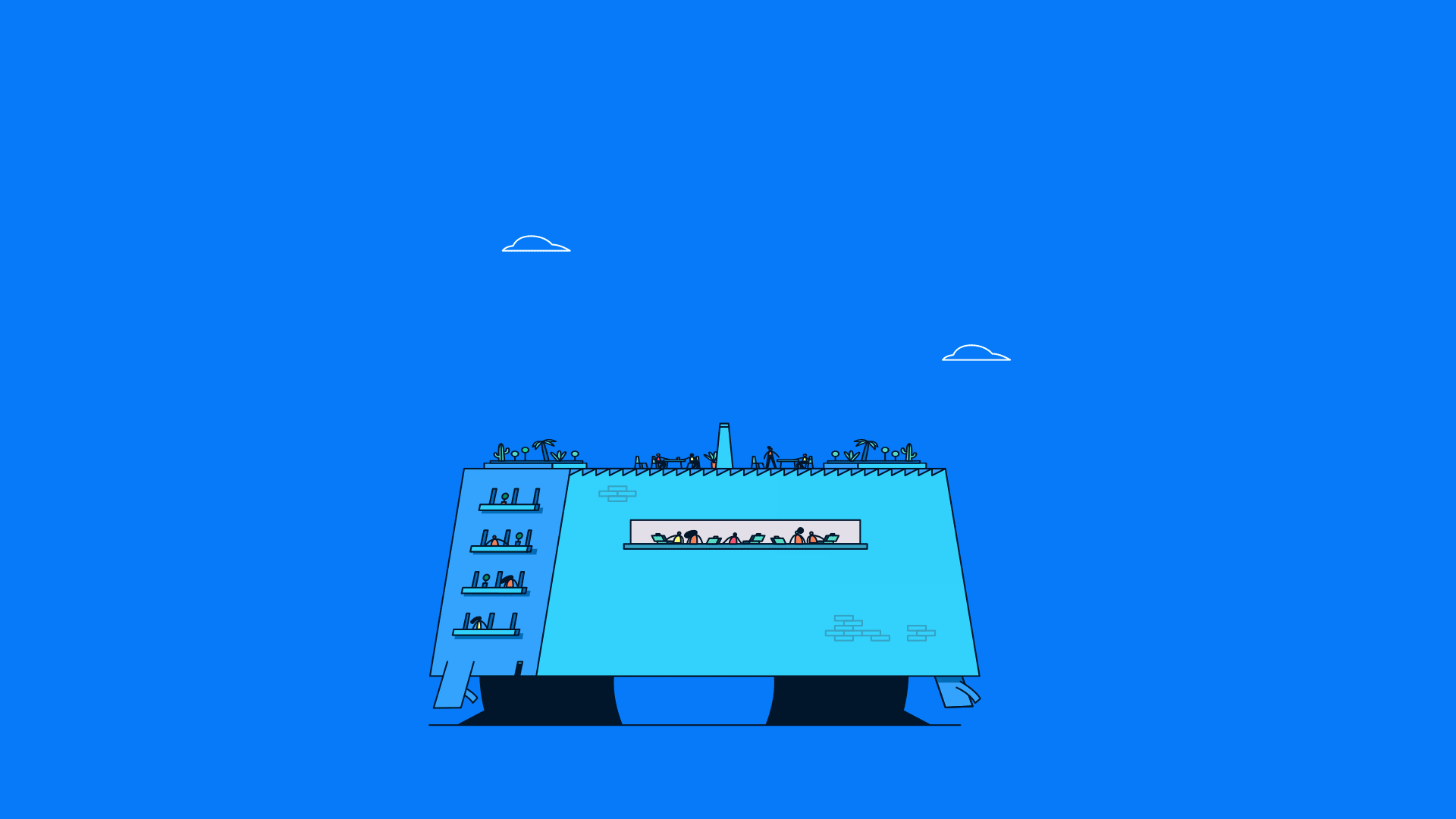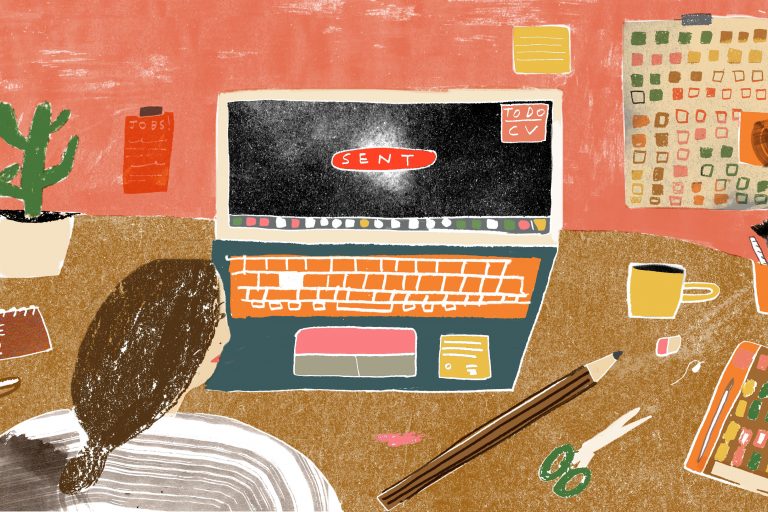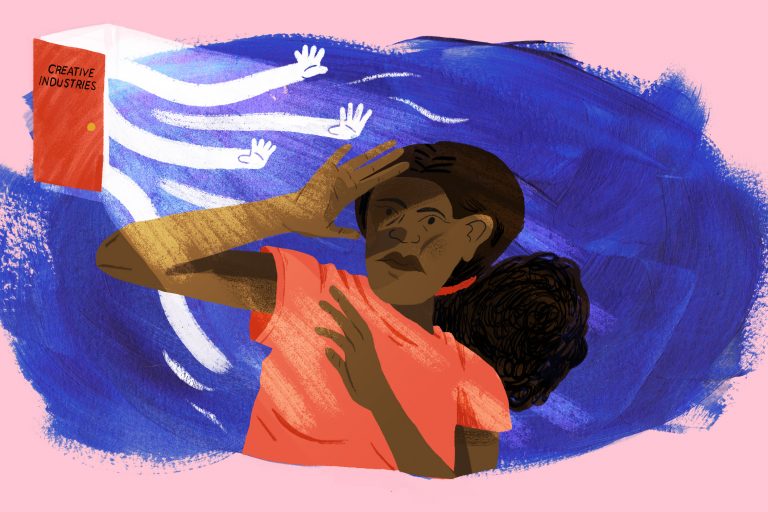
Hungry talent, meet starving industry
Ellen Ling believes that the advertising industry needs to re-shape its recruitment culture around the idea of exchange. Illustrated by Michael Lester.
Words by Ellen Ling
Illustration by Michael Lester
We need new talent in the creative industry. Obvious opener there, I know. But it shouldn’t be about a ‘giving back’ mentality. Sure, it’s great to give someone the break they deserve, and experience they’re desperate to gain, but let’s not kid ourselves, it’s the industry that’s in desperate need of their fresh thinking. We have to start making way for it. For me that means a shift in attitude, from top to bottom.
I used to work on D&AD’s ‘New Blood’ programme, so I heard that opening line a whole lot. Now hold up, this isn’t about to turn into some kind of exposé. I believed in what we were trying to achieve through New Blood, and I still stand by it now. Still, I can’t help thinking, looking back, that my own outlook was a bit off at times. In interviews I’d find myself asking industry mentors if the talent they saw through New Blood ‘scared’ them. I wanted them to play along, feeding me sound bites about how ‘scared for their jobs’ they were. To me that somehow elevated this new talent. If it posed a threat then people would sit up and pay attention. Boy, was I asking the wrong question. Because ultimately it’s something we should all welcome, and learn from ourselves.
Unfortunately, right now there seems to be a disappointing disconnect between that new talent — whether that’s from education, awards programs or other schemes for identifying and nurturing talent — and the industry. Early on, I assumed that once we got them into a job, there was a happy ending. Wrong again.
In my experience, emerging creatives come to the industry with one of two pieces of baggage. Either they’ve been told that they’re the future and are going to change the world through creativity, or that this industry expects them to pay their dues, so they’d better keep their heads down. The first leaves pumped-up individuals let down when, all too often, they discover there’s no such opportunity waiting for them straight away. And the second can strip away individuality and confidence, and create frustration. Neither sounds very inspiring. Those up-and-comers have a responsibility too, of course. The industry doesn’t owe you a living simply because you graduated, you need to claim your place. But what good is simply getting the next generation hired, if we’re not actually tapping into their real value?

Hungry talent needs feeding. But hey, it’s not only newbies that are starving here. It runs deeper than how we support emerging talent. What happened to the last ‘next generation of creative superstars’, or the one before that? Here’s the nitty gritty for me; we should be willing to learn from the thinking that surrounds us, no matter what career stage or pay grade it comes from. That naturally starts with proactively surrounding ourselves with diverse thinking. And if we created a culture of exchange throughout our industry, wouldn’t we all make better work?
I’ve had my foot in the door for a little while, but my foot’s job is far from done. That can be a tricky space to navigate. Spending a lot of time around senior creatives at D&AD (most of them with intimidating, award-winning successes to their names) put this idea in my head. The idea that I wanted to ‘make it’. Constantly asking said creatives how they ‘broke into the industry’ or ‘got to where they are’, ramped up the pressure. But the practicalities of moving up, once you’re in, can start to eclipse your original hunger to just ‘make good shit’. And that only closes us off to different ways of thinking. It was only when I stopped writing about good design and advertising, and set out to make some of it myself, that I appreciated the real power of collaboration. If you’re thrashing out an idea and you’re not hearing different points of view or opposing opinions, then it’s alarm bells you should be hearing instead.
New talent is cited as our go-to source for a much-needed injection of energy, but diversity also kills complacency. And I mean diversity in every sense of the word, background, gender, thinking, discipline, the whole shebang. In an industry that preaches about brave, left-field, off-kilter, original ideas, why isn’t our infrastructure geared at sustaining them? The people who engage with our work are a diverse audience, but we know the make-up of our industry is far from it. Anyone can have a great idea, but we tend to recruit in the same monotonous ways. Different opinions can make for the richest outcomes, but unconscious bias is still a massive problem for us.
I’m not some kind of anarchist, authority hater. Really. Experience, skill and craft obviously warrant respect. I’m lucky to have learnt, and still be learning, from some incredibly in-the-know folk (consider that a compliment to them, not a humble brag from me). They respect what I have to contribute, my take on things and don’t pull rank when I pick holes in things. It’s a trade. Don’t get me wrong, I’ve had plenty of negative experiences too. It’s the dirty looks I was shot for piping up with opinions as ‘the intern’ that led me to think exchange is the way forward.

Another favourite interview question of mine was, “what’s the best piece of advice anyone’s ever given you?” Pure gold that. You’d hear all sorts, the weird and wonderful things that had shaped these, now leading, creatives when they were starting out. The one that’s stuck with me from those interviews, apart from “always carry a clean tissue”, is “if you can think, we can teach you everything else”. I love that sentiment. If you take away the experience that defines our careers, and the skills that have determined which directions they’ve gone in, we’re all just people with ideas. We should remind ourselves of that.
If I were to preach (which I fear I’m about to), I’d say that where there’s hierarchy, there should also be transparency. Where there are established ways of thinking, we need to leave space for challenge. Where there’s experience and convention, let’s open ourselves up to fresh perspectives and disruption. Because established creatives might know what they’re doing, but you’ll know things they don’t. Your novice view on something could be a blind spot for someone else. If you don’t agree with a practice, un-do it.
The commercial creativity industry is a monster business. But we all know that the more ‘marketingy’ our marketing output, the less effective that marketing actually is. Tricky clients and nervous budgeters aside, that’s a bloody amazing rationale for making good shit. This industry thrives on unconventional, irreverent and subversive thinking. We interrogate briefs, but it’s our job to interrogate what we’re bringing to that process too. To stay relevant, and keep making relevant creative, we have to stay open.
It all starts with the ‘we need new talent’ debate, but there are a zillion layers to the issue. If I had to break it down, I’d probably pin my hopes on these three; we have to make way for new talent, make use of their fresh thinking in a more meaningful way, and create a system that keeps us all thinking fresh too. All that can only give rise to bolder, braver work.

This feature was produced in partnership with Transferwise who are supporting our efforts to work with a global network of young creatives by helping to make the financial system fair. TransferWise is the lowest cost and fairest way of transferring money internationally and is a great tool for freelancers who get a rotten deal from the banks and brokers alike. Click here to try them out today. Ellen Ling is a Creative at LOVE and we encourage you to follow her here. Michael Lester is a creative colossus, although he specialises in design, illustration and animation. You can follow him here.









